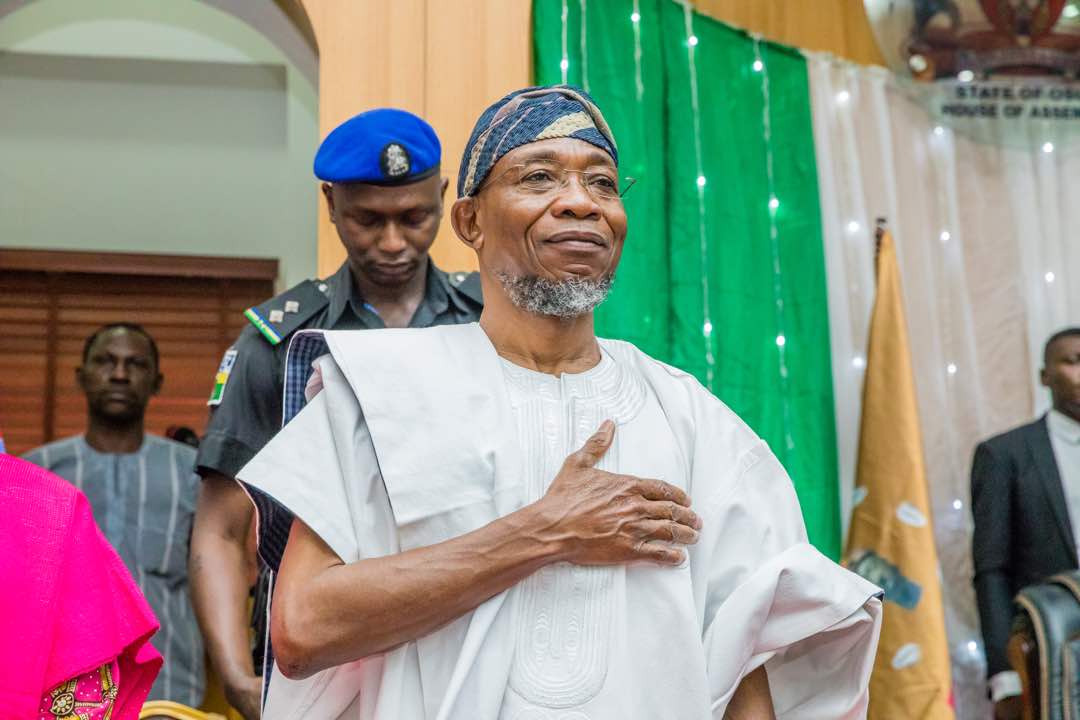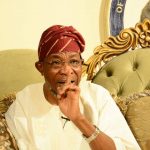
The Making Of A Leader: Ogbeni @61
To lead is “to show the way by going first”. It is to guide, to indicate the direction of movement and provide others in charting and following the new direction. It is also to control. But to control denotes not only to command and regulate, but to restrain and exercise self-restrain too. This is how Chambers Twentieth Century Dictionary sees it: (MacDonald, 1979:282, 748). Essentially, therefore leadership denotes guidance. It connotes encapsulating in oneself the basic elements of a chosen direction, serving as the embodiment, or the model, as well as the conveyer of a given social movement. Chinua Achebe was particularly right when he argued that the responsibility and the challenge of personal example “are the hall-marks of true leadership”.

Leadership is different from the exercise of authority, the wielding of power or use of legitimate force. Nor is leadership a matter of status and privilege. One can attain a high social or economic status and enjoy great privilege without being a leader. Having a high position or standing in a society or in a social group is different from providing the spiritual and intellectual guidance for the society or group. One is a condition, the other a behavior. One can attain the status of a professor in an academic discipline, yet be incapable of providing academic leadership. Similarly one can be in authority without being a leader.
To be in authority means to be in office. A Vice-chancellor of a university is an authority; but may or may not be a leader. And being in power is quite different from providing leadership. The chairman of a political party is in power; but he may not necessarily be the leader of the party. The president of a country is in office; but whether he occupies a political leadership position depends upon his behavior and performance.
In leadership, it is influence. Influence is the capacity to bring about an effect by subtle means -the sheer force of personality: the ability to evoke deep respect and administration; or the capacity to elicit affection, love and loyalty. All these attributes encapsulated in the personality of the man called Ogbeni Rauf Aregbesola.
As a young man, Rauf loves politics and believes its is a way for him to partake in society and helps others. His love began when he was a very young man as a student at the Polytechnic Ibadan. He was active in student politics and was an active supporter of other progressive student’s movement worldwide. At the Polytechnic Ibadan, he became Honorable Speaker of the Students’ Union Parliament as well as president of the League Nationalist (LBN) between 1978 and 1980. He read several books and regularly travelled around Nigeria.
He came in contact with socialist orientation in Polytechnic Ibadan with his relationship with Late Comrade Olaoni, his ideology mentor and other Comrades of Bodija river valley revolutionary vanguard i.e. Comrade Laoye Sanda, Comrade Femi Aborisade, Comrade Bimbo Daniyan, Comrade Gbenga Awosode, Pro. Ojo, Prof. Bade Onimode, Prof. G. G Darah, Prof. Onoge Omafume and a host of others. They were all connected with scientific doctrine of dialectical philosophy and historical materialism which is the core of the philosophical system of Maxism-Leininisim.
Rauf Aregbesola is a strange and talented politician. His politics is different from that of many of his colleagues who believe that politics and power should be used to oppress the people and steal public funds. He sees public office as a place to serve people and manage resources efficiently to the greatest benefit of all. He believes in the principle of respect for those who voted and put public office holders in the positions of authority. He is excellent as a pro-democracy and human rights activist who joined others to lead the struggle of Nigerians to free themselves from military rule and bring democracy to the country at the end of the 1990s.
Rauf keeps his lifestyle very simple and modest. He is a serious-minded politician who does not have time for flamboyant, extravagant and ostentatious life because he wants to remain like the rest of the people. He is well-focused and resourceful.
Rauf loved and enjoyed his work in Lagos, but his desire to contribute to the improvement of the people in Osun was yet to be satisfied. He never for once deserted Osun, his home state where his aged mother – now late, brothers, sisters, and numerous members of his family live. He visited Ilesa regularly and took interest in the affairs of the state.
Rauf and his team laid out specific plans on how they could make Osun to be great. In his campaign manifesto, he captured the mood of the people of the state of Osun. He then used the six point’s integral action plan to canvass for his election as governor.
The Six Points Integral Action Plan is:
Banish Unemployment, Banish Poverty, Banish Hunger, Restore Healthy Living, Enhance Communal Peace and Progress, and Promote Functional Education.
It was this agenda that made people to vote for Rauf in the April 2007 gubernatorial election. The task ahead was great and Rauf, as a hard working and honest man, was quite aware of the great burden that the mantle of leadership had been placed upon his shoulders.
The man Rauf vigorously pursued his progressive development agenda which today has placed Osun in the global picture of development and growth. He has changed the face of Osun from the low level of economy wretchedness to prosperity.
The state capital has been lifted from a glorify village to the status of a state capital in any part of Africa.
Ogbeni has brought social development, infrastructural development and economic development which are the three key fundamentals for growth.
Bravo to our revolutionary leader @61


